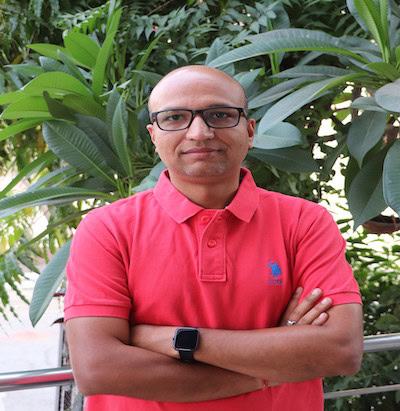How was our Universe created? How did it come to be the seemingly infinite place we know of today? And what will become of it, ages from now? The Big Bang hypothesis states that all of the current and past matter in the Universe came into existence roughly 13.8 billion years ago when all matter compacted into a very small ball and exploded, causing expansion and the universe (as we know it) began.
Are you curious about such questions on the origins of life on Earth and exploring a hypothesis around it? How can life start from a bunch of chemicals? Do we have a recipe to create synthetic life in the lab? If so, can the Jurassic Park scenario be created again? Can recent extinct creatures come to life again? This course will help you fuel your curiosity and state your hypothesis.
Synthetic Biology is about looking at biological systems through the lens and formalisms of engineering. This entails gaining fundamental insights into the functions at the molecular level of biological processes. The other way to look at the biological processes is starting from whole organisms. Combining both may shed light on the century-old problem – How did life emerge on Earth?
Life: Origin & Synthesis is a live interdisciplinary course that delves into the fascinating field of abiogenesis and synthetic biology, exploring the principles that underpin the origin of life on Earth. Through theoretical knowledge and practical applications, you will investigate how life emerged and the potential for creating life in laboratory settings. This understanding will be enhanced by examining scientific evidence surrounding the origin of life, from primordial chemical processes to complex life forms.
The course will entail an experiential capstone project where you will be involved in addressing hypotheses and conducting research to solve your chosen hypothesis, which will include research questions regarding the emergence of life. The capstone project will culminate into a research presentation and a collaborative exploration of the implications of experiment findings, on the key question – can life be created in a test tube?
What’s more? If you have one of the best plausible presentations and arguments, you will be invited to Ashoka University to observe the science laboratories and conduct experiments to further explore such topics.*
Are you ready to explore the mysteries of life’s beginnings and the exciting possibilities of creating life anew?
*The invitation to work in the lab will be based on prior lab safety approval, inspection and standards clearance.
Enroll Now Existing User? Log InThe course is suitable for high schoolers studying biology and chemistry, or related fields. It is for those interested in the fields of bioengineering, biochemistry, biotechnology etc. It is ideal for anyone curious about the origins of life and the future of synthetic organisms.
Prerequisites: High proficiency in written & spoken English. You will be required to submit your latest mark sheet in the application form.
By the end of the programme, you will:
| Week | Lecture Module | Project Module |
|---|---|---|
| Week 1 | Life origins: Principles & theories Understand the key theories and hypotheses that explain how life may have originated from non-living matter.
|
Frame the hypothesis: Research question
Choose your favorite hypothesis around the question of how life originated on Earth and kickstart your research to defend the feasibility of the hypothesis. Think about questions such as how did the first cells of this life emerged on Earth, how the Earth’s atmosphere supported the rise of this life, how simple molecules evolved into these complex life forms etc. |
| Week 2 | Life origins: Supporting evidence
Examine geological and biological evidence supporting theories of life’s beginnings and evolution.
|
Gather evidence: Literature review
Gather evidence to support your hypothesis about how life emerged on Earth and conduct a literature review from various sources. Think about questions such as how laws of chemistry support life origins, how conditions of land & sea support the survival and evolution of life, how life could have existed in outer space etc. |
| Week 3 | Synthetic biology: Fundamentals & applications
Explore the basics of synthetic biology, focusing on how scientists attempt to create synthetic life in controlled environments.
|
Test the hypothesis: Design experiments
Design and conduct experiments in a controlled environment to reflect on how life can be created in a lab and assess the impact it could create on the existing environment. Consider how chemical reactions led to biological evolution, whether first life forms began through an evolutionary ‘accident’ on earth, how the first organic molecules formed on earth, etc. |
| Week 4 | Synthetic biology: Can life be created in a test tube?
|
Demo day: Present your research
Present the gathered evidence and experiment findings on the origin of the specific life form. Answer questions such as how can life exist on other planetary bodies, how can life be created in a lab, how could life have originated from non-cellular matter etc. |
| Week 5 | Counselling:
Get a chance to ask the faculty and the mentor questions and get their answers and perspective. You are encouraged to ask questions to the faculty about the following aspects:
|
Mentoring:
You are encouraged to ask questions to the mentor around the following aspects:
|
As your capstone project, you will be involved in addressing questions and conducting research to solve the chosen hypothesis, which will include research questions regarding the emergence of life. For example, what is the evidence that life originated on Earth? If life originated on Earth, what were the early conditions? What do they look like? How did it propagate and evolve? By addressing these questions, students will design experiments to create life in the laboratory. The project will culminate into a research presentation, argument write-up and a collaborative exploration of the implications of experiment findings, on the key question – can life be created in a test tube?

Alok Bhattacharya is a Professor of Biology. He is the recipient of Robert McNamara Fellowship (World Bank), Rockefeller Biotechnology Career Development Award, Shanti Swarup Bhatnagar Prize and JC Bose Fellowship, and is a fellow of Indian National Science Academy and Indian Academy of Sciences. He also served as one of the Vice Presidents of INSA. Following his Ph.D. at Jawaharlal Nehru University, India, he trained at the National Cancer Institute and Harvard Medical School, USA. He spent a large part of his independent career at the Jawaharlal Nehru University, New Delhi, where his scientific interests were in the area of infectious diseases, biology of parasitic pathogens and genomics. He is credited with helping to set up one of the first teaching and research programs on Bioinformatics and Computation Biology in India. His current research interests are rare diseases, computational genomics and biology of pathogenic parasites.

Sandeep Ameta is an experimentalist interested in building evolvable synthetic systems using interdisciplinary approaches. Despite immense efforts, how to build a synthetic chemical system that can evolve and what constitutes it remains an open question. Similarly, the series of steps that led to the emergence of self-sustaining living systems on the early Earth are still elusive. To address some of these questions, he is developing synthetic chemical systems capable of undergoing evolution and demonstrating ‘life-like’ features. His work revolves around self-replicating chemical systems, phase-separated droplets, droplet-based microfluidics, single-cell/droplet sequencing, and other biophysical methods.
Before joining Ashoka, Sandeep was an independent Campus fellow at Simons Centre for the Study of Living Machines at the National Centre for Biological Sciences (NCBS), Bangalore. Prior to that, he was a postdoctoral fellow at ESPCI Paris (École supérieure de physique et de chimie industrielles de la Ville de Paris), France and PhD from Heidelberg University, Germany. He did his Master’s in Biotechnology from the Indian Institute of Technology Bombay (IIT Bombay) and Bachelor’s in Biotechnology from the University of Rajasthan.
Grading, Assessments, Certification and much more
All Ashoka Horizons courses offer a certificate on satisfactory completion of the programme.
Class participation will be assessed based on your active engagement in live sessions, contributions to discussion forums, and involvement in Teaching Fellow-led activities.
Achieve More…with Horizons:
*For select students, subject to discretion of the faculty
This programme is administered through an online platform. Students are expected to have a foundational understanding of computer usage, including but not limited to sending emails and conducting Internet searches. Consistent access to the Internet and a computer that aligns with the recommended minimum specifications are also requisite for participation in the programme.
Have a question about Ashoka Horizons Achievers Programme? Write to us on horizons@ashoka.edu.in
Yes, there’s certainly been a lot that I’ve learned. While I had a foundational understanding of genetics which led to much of the first session being revision, the archaeological aspect of this course has been completely novel. I never knew how different isotopes provide information about past climates, and the nutritional intake of past cultures. Moreover, learning about mass spectrometry and gas chromatography was certainly new, and lipid analysis was something I had never done before.
Our batch size is relatively small, but I think that that’s a good thing, because we usually get to bounce questions off each other and the professor. I would say that it took a couple of sessions, but now most people in our batch are decently comfortable around each other.
